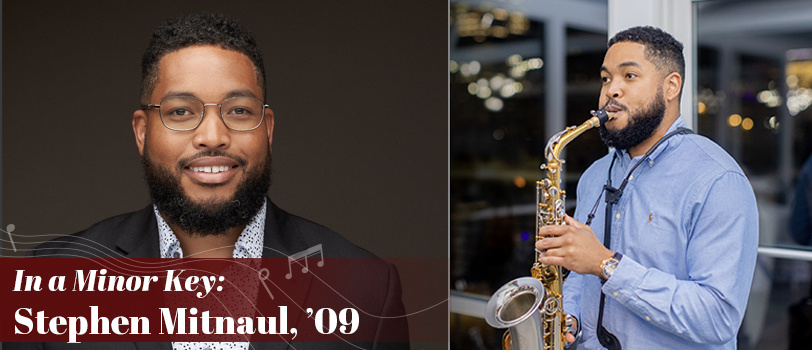In this inaugural feature, we begin a new series spotlighting alumni who minored in music and talk with them about how that minor impacted their career and life.
Stephen Mitnaul, 09
Bachelor of Science, chemical engineering
Minor in Music, saxophone
Stephen Mitnaul is currently a Senior Specialist in Large Molecule Manufacturing at Merck outside of Philadelphia. He’s a member of the National Society of Black Engineers and is also actively engaged in youth mentoring through Kappa Alpha Psi’s Kappa League Achievement Academy — which provides multi-faceted mentoring, counseling, and training for young, African-American men ages 9-18.
Why did you choose to minor at the USC School of Music?
It’s quite easy to be passionate about music under the tutelage of instructors like Mr. Willie E. Lyles, Mr. Freddie E. Grace, and Mrs. Carolyn Cleveland at W.J. Keenan High School. I played in my high school’s marching, concert, and jazz bands; I was a member of the full orchestra and concert choir; I played in a community big band jazz band, I managed my own band, and I also produced music. I knew too many talented, older students who lost their passion for music after their high school graduation — unless they majored in music — so I pursued a minor in music as a means of ensuring music was an integral part of my collegiate experience.
What ensemble(s) did you perform with while at USC?
I performed with the marching band and university band while at USC.
What person, course or experience was most influential for you while at the School of Music? How?
Jazz Theory was the most influential course for me. I didn’t start playing jazz until my junior year of high school, so I still had much to learn. Prior to that class, my approach to improvisation was primarily reactionary; Jazz Theory brought intentionality to my improvisation skillset and furthered my interest in jazz music. Moreover, improvisation is a major component of the performances I have today with The Smooth Show, a Philadelphia-based band I started shortly after relocating to the area upon my graduation from USC.
How has your minor in music helped you in your life and career?
My music minor successfully ensured music is currently a major component of my everyday life — giving me balance and an outlet for creative energy that enhances my overall well-being and mental health. Additionally, pursuing my music minor alongside my major in chemical engineering and leadership roles in Kappa Alpha Psi and National Society of Black Engineers helped develop my time management skills. Time management is how I’m able to maintain high productivity in my career with Merck today while still dedicating time to my passions outside of my career.
What is one of your favorite memories, classes, professors or activities while attending the School of Music?
One of my favorite memories has to be the marching band’s trip to the University of Tennessee for our football game against the Volunteers. I was eager to go to the game because I used to live in Knoxville and root for the Vols as a kid, but I’d never been to Neyland Stadium. I got to witness history in Steve Spurrier’s inaugural season when our Gamecocks won in Tennessee for the first time ever! And the trip was particularly special because (1) I shook hands with the legendary Pat Summitt prior to taking the field for our halftime show, and (2) I, along with my roommates for the road trip, threw an epic hotel party the night before the game. I couldn’t ask for anything more from the School of Music after that!
What advice would you give prospective or current students considering a minor in music?
The USC School of Music won’t make you feel like a second-class citizen as a minor. There are a plethora of resources available to those who successfully audition for the School of Music, and the curriculum is such that you’ll have the time to appropriately focus on your major. Any person minoring in music has an obvious passion for music, so my advice would be to seize the opportunity to create a lifelong avocation in music with your minor.
